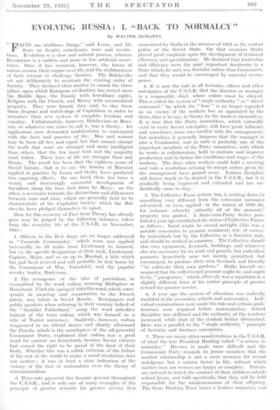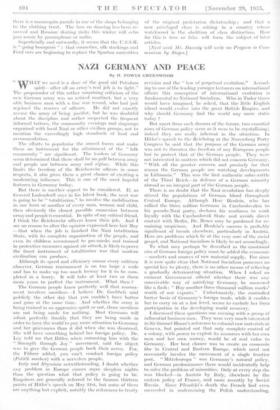EVOLVING RUSSIA : I. " BACK TO NORMALCY " By
WALTER DURA,NTY -TACTS are stubborn things," said Lenin, and' life flows on despite cataclysms, wars and revolu- tions. Evolution is a slow and natural process, whereas Revolution is a sudden and more or less artificial occurs renee. Once it has occurred,' , however, „ the forces of nature resume their empire over life, and the stubbornness of facts returns to challenge theories. The Bolsheviks set • out delibetately to overturn the existing order of Society. They declared their resolve to smash the three pillars upon which European Civilisation has rested since the Middle Ages—the Family with hereditary rights, Religion with the Church, and Money with accumulated property. They were bound, they said, to slay these three dragons and watch-dogs of. Capitalism in order to introduce their new system of complete freedom and equality.. Unfortunately, however, .Bolshevism or •Marx- ism, or whatever one cares to call it, was a theory. Its application soon demanded modifications to correspond with. the facts and practice of life. Men and: women may be born all free and equal, but that cannot change the struth that some are stronger and more intelligent than others, that the few must lead and the majority must follow, These laws of life are stronger than any theory. . The result has been that the eighteen years of Soviet history, that is to say, the history of Marxism applied in practice by Lenin and Stalin, have produced twos opposing effects. On one hand there has been a steady and increasingly successful development of Socialism along the lines laid down by Marx ; on the other, a reversion toWards the distinctions and differences between man and mans which are - generally • held to be characteristic of the Capitalist Society which the Bol- sheviks have pledged themselves to upset.
How far this recovery of Fact from Theory has already gone may be 'judged ' bY the following instances taken • from the everyday life of the 'U.S.S.R. in November, 1935.. . . .
1. Officers in the Red Army are no longer addressed. as ." Comrade Commander," which term was applied universally to all ranks from Lieutenant to General, but, by the specific designation of their rank, Lieutenant, Captain, Majot, and so on up to Marshal, a title which haS just been revived and will probably. be first borne by the Commissar of War, Voroshilof, and the popular cavalry lead er, Bilyenny. .
2. The resurgence of the idea of patriotism, as exemplified by the word rodina, meaning Birthplace or Homeland. Until the spring of 1934 this word, which corre- sponds in meaning and connotation to the French. patrie, was. taboo in Soviet Russia. 'Newspapers and public speakers when referring to their country talked-of the " Socialist Fatherland,'.', using the word oteteslavo instead of the term rodina, which was banned as a relic of Tsarist autocracy. Suddenly, 'however, rodina reappeared in an official decree and shortly afterward the Pravda, which is the mouthpiece of the all-powerful Communist Party, explained that rodina was a good word for current use henceforth, because Soviet citizens had earned the right to be proud of the land of their birth. Whether this was a subtle criticism of the failure of the rest of the world to make a social revolution does not matter ; it was at least .a 'clear indication of the victory of the fact of nationalism over the theory of internationalism. 3:Piece-rate paythent has: beebrne general' throughout the -U.S.S.R., 'and is only one of many examples of the principle of &eater rewards for greatet service first enunciated by Stalin in the summer of 1931 as the central policy of the SoViet State. On that Occasion Stalin placed great emphasis upon the development of technical efficiency and specialisation. He declared that leadership and. efficiency., were the most important desiderata in a State which, he .said, was Socialist rather than Communist, and that they would be encouraged. by material teconis pence.
4. It is now the rule in all factories, offices and other, enterprises of the U.S.S.R. that the director or manager is a responsible chief, whose orders must be obeyed. This is called the system of " single authority " or " direct command," by which the " boss " is no longer regarded as an enemy 'of the smirkers but as appointed by the State, that is to say, in theory, by the workers themselves. It is true that the Party committees,' which' naturally exist in every Soviet • enterprise, still have great influenee. and' sometimes come' into .confliat with the management;1. but nowadays it generally happens that 'the "Manager 'is' also a ComMunist; and' as such is probably' one of the important members of the Party committee, with "which he works in collaboration, both to increase and improte production and to better the conditions and wages of the workers. The days when workers could hold 'a meeting' and vote a resolution refusing to accept orders given' by' the management have passed away. Labour discipline still leaves much to be desired in the U.S.S.R., but it is gradually being improved and extended and has urf: doubtedly come to stay.
5. The Collective Farm, system, too, is settling down ta • something very different from the extremist measures adVocated, 'or even applied-..-in the winter of 1929-:-3O, for instance—whereby virtually all of the peasants'. property was pooled. A State-cum-Patty decree pubs lished a year ago established the status of Collective,Faxins, as follows Land might be owned outright .(this was a notable concession to peasant sentiment) not, of courseS by individuals but by the Collective as a Socialist. unit,. and should be worked in common. The Collective should also own equipment, livestock, buildings, and whatever else was necessary for its work and growth, but individual peasants henceforth were not merely permitted, but encouraged, to produce their own livestock and literally " to cultivate .their • own gardens." ' Stalin 'himself an- nounced that the collectivised peasant might be, and ought to be, " prosperous," which, after all, was a repetition in a. slightly different form of his earlier principle of greater reward for greater service. • . • ; • 6. A year ago the' system of edueation was radically' modified in the secondary schools and universities. - Indi vidual examinations were made the rule andcertain 'quali- fications were required before matriculation. School discipline was stiffened and the anthOrity of the leaehers- increased, while that Of the student 'bodies diminiShed." Here' was a 'parallel' to the " single anthotity " 'principle of factories and business enterprises. . , 7. There are many other manifestations in the U.S.S.R. of what -the late President Harding called " a return to northaley." bivo'ree is made more difficult and the CoMmunist Party reminds its junior members that the marital relationship is not a mere occasion for sexual indulgence but 'a serious factor in life, without which neither men nor women are happy or complete. Parents are ordered to watch the conduct of their childrenoutside . school hours, and told specifically that they will be held, responsible" for 'the misdemeanours of their offspring. The State. Printing Trust issues a fashion magazine, and there is a mannequin parade in one of the shops belonging to the clothing trust. The ban on (lancing has been re- moved and Russian skating rinks this • winter will echo jazz music by gramophone or radio.
Superficially and outwardly, it seems that the U.S.S.R. is " going bourgeois " ; that cosmetics, silk stockings and Ford cars are beginning to replace the Spartan austerities of the original proletarian .dictatorship ; and that a new privileged class is arising in a country whose watchword is the abolition of class distinction. How far this is true or false will form the subject of later articles.
[Next week Mr. Duranty will write on Progress to Com- munism by Stages.]













































 Previous page
Previous page